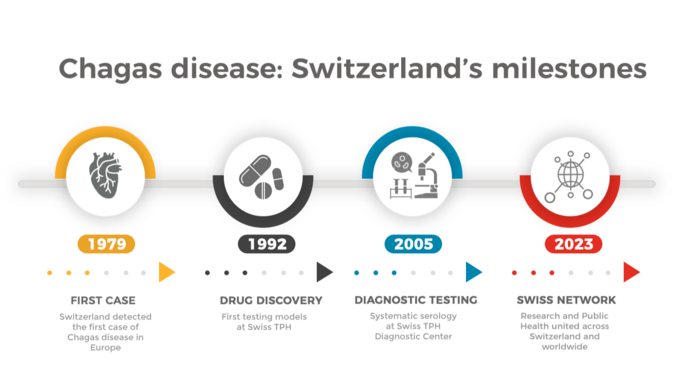From Discovery to Action: Four Decades of Swiss Leadership in Chagas Disease Research and Control
14.04.2025
Once confined to Latin America, Chagas disease has become a global health concern, affecting thousands in Europe as well. For over 40 years, the Swiss Tropical and Public Health Institute (Swiss TPH) has led efforts in research, diagnostics, and control, making Switzerland a blueprint for affected countries in tackling this tropical disease. On World Chagas Disease Day, WHO urges all health actors and civil society to strengthen efforts in awareness, prevention, surveillance, early detection, and treatment to eliminate transmission and provide care for affected population.

The graph shows Switzerland's milestones in Chagas disease research and control. (Illustration: Ivan Pasanau for Swiss TPH)
The Silent Progression of Chagas Disease
Chagas disease, caused by the parasite Trypanosoma cruzi, has long been associated with rural areas of Latin America. However, global migration and increased international travel have transformed it into a worldwide health concern, affecting over 7 million people globally, leading to more than 10,000 deaths every year. Over 100 million people are considered at risk of infection.
One of the most insidious aspects of Chagas disease is its prolonged asymptomatic phase. Many individuals remain unaware of their infection for decades, with symptoms manifesting only in the chronic phase, leading to severe cardiac, digestive, or neurological complications. This delayed onset underscores the critical importance of surveillance and early detection, even in regions like Europe where the infected insect vector, the triatomine bug, is absent.
Early Recognition and Response in Switzerland
Switzerland's proactive stance against Chagas disease dates back over four decades. In 1979, the University Hospital of Berne diagnosed the first documented case of imported Chagas disease in Europe—a 32-year-old woman presenting with severe cardiac complications. A recent review in the Swiss Medical Weekly found that an estimated 2,000 to 4,000 people in Switzerland are affected by the tropical disease. While most of the cases are imported cases, the study also shows that Chagas disease can be transmitted in Switzerland through mother-child transmission during pregnancy and childbirth.
The Swiss Tropical and Public Health Institute (Swiss TPH) has been instrumental in advancing Chagas disease research and public health initiatives across Switzerland. On the one hand, Swiss TPH initiated a drug discovery programme in the early 1990s, leveraging its expertise in cultivating trypanosomatid parasites. Swiss TPH worked with partners such as the WHO Special Programme for Research and Training in Tropical Diseases (TDR) and Drugs for Neglected Diseases initiative (DNDi) to develop and refine medicine testing models.
In addition, Swiss TPH has developed, validated and implemented various diagnostic tests for Chagas disease over the last 20 years including rapid diagnostic tests and molecular methods to detect the pathogen DNA.
A Blueprint for Non-Endemic Territories
In 2023, underscoring the need for coordinated action, Swiss TPH collaborated with WHO and other partners to establish the Swiss Chagas Network. This initiative aims to interrupt transmission and eliminate Chagas disease as a public health problem in Switzerland. Key priorities include integrating screening into paediatric, childbearing-age, and prenatal care for early detection, preventing mother-to-child transmission during pregnancy and childbirth, and ensuring that individuals affected by Chagas disease receive appropriate care.
Switzerland's comprehensive approach can serve as a model for other non-endemic territories facing the challenges of Chagas disease:
- Early Detection: Implementing systematic screening, especially among at-risk populations, to identify and treat infections before they progress to clinical manifestations and complications.
- Public Awareness: Educating healthcare professionals and general public about Chagas disease to reduce underdiagnosis and ensure timely interventions.
- Research and Collaboration: Investing in research and fostering international partnerships to develop better diagnostics, treatments, and preventive strategies.
Recently, Swiss TPH and WHO have also strengthened their collaboration to further advance towards the elimination of Chagas disease in Switzerland and globally, by working together on the development of a methodology that will allow countries and regions around the world to advancing disease control, with laboratory and epidemiological comparability, enabling to certify the interruption of disease transmission.
World Chagas Day
Observed annually on April 14th, World Chagas Disease Day highlights the urgent need for action against Chagas disease, which continues to disproportionately affect poor and marginalized communities. This year’s theme is “Prevent, Control, Care: Everyone’s role in Chagas disease”. Increased awareness, improved access to diagnosis and treatment, and stronger international cooperation are critical steps toward controlling and eventually eliminating this neglected disease.
Contact

Mar Velarde
Scientific Collaborator I
+41612848766
mar.velarde@swisstph.ch
Stay connected
Subscribe to our newsletter and get all the latest research news, project updates, course and event listings from Swiss TPH.